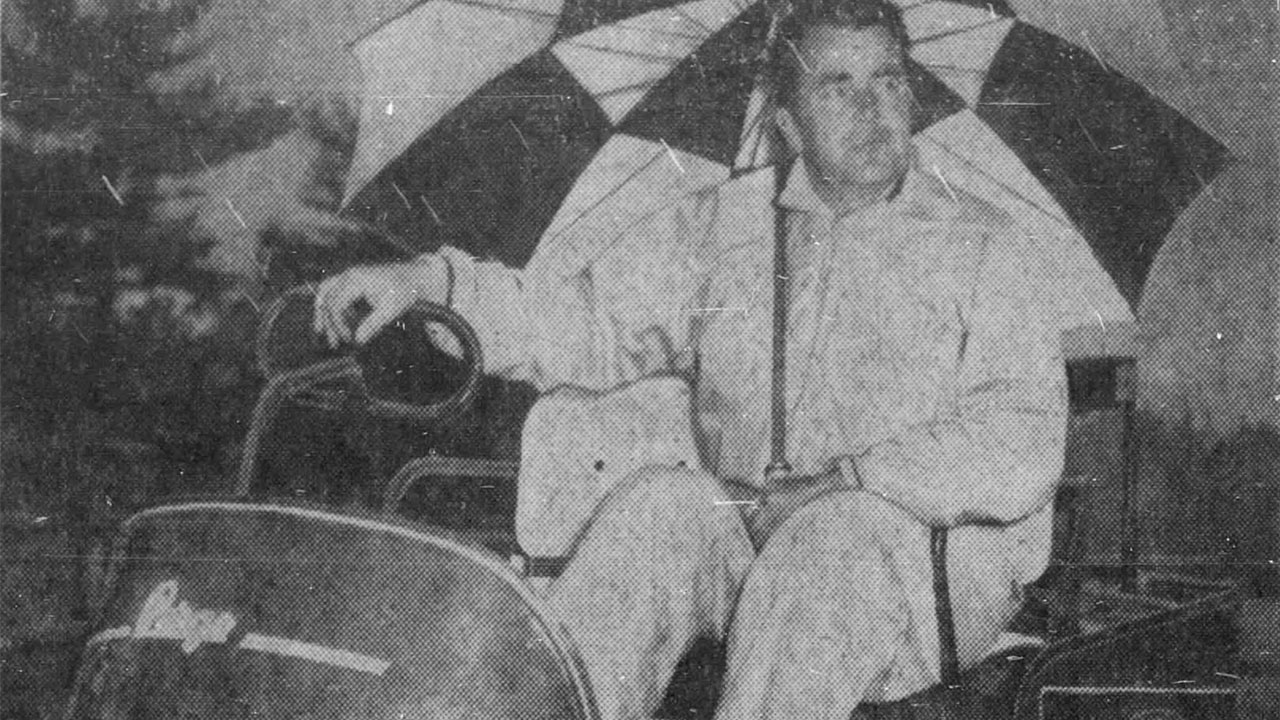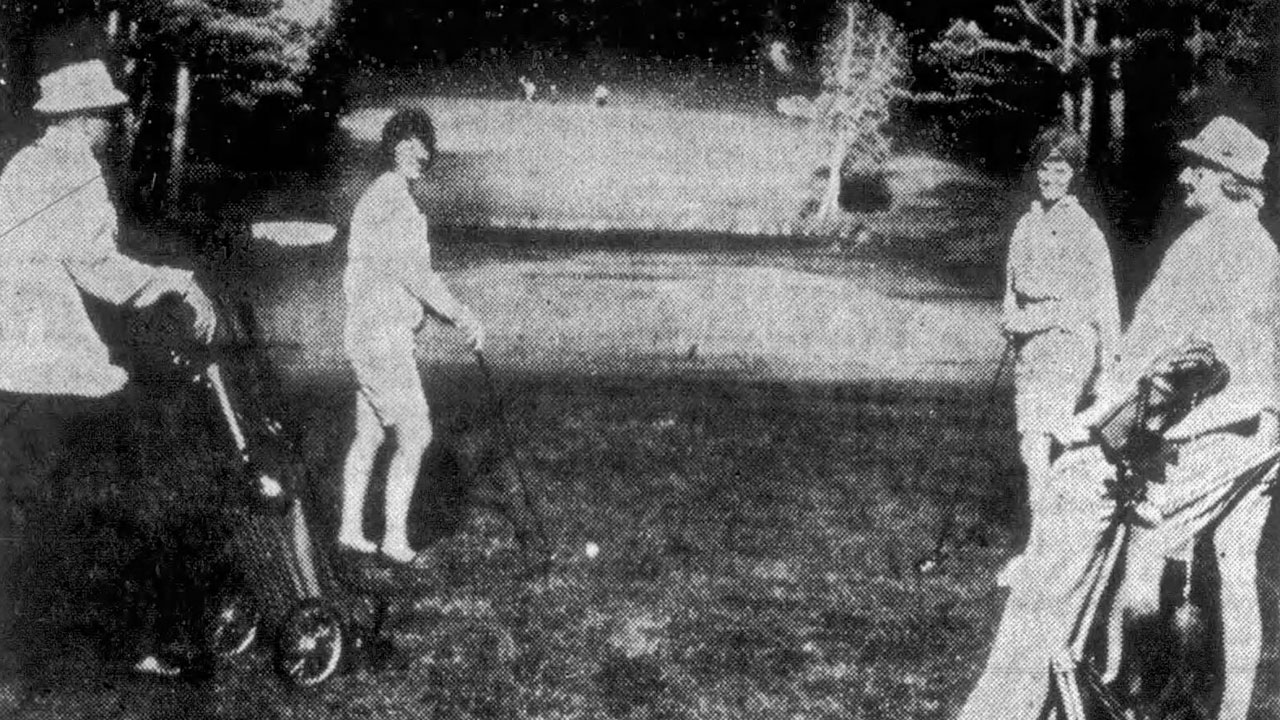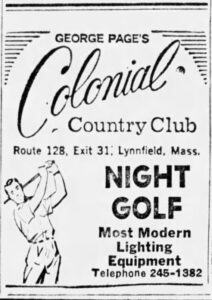As daylight continues to wan in our inevitable dash toward winter, so do the daily hours we have to play golf. Sixty years ago, a novel concept was popping up in sporadic pockets of the country: golf under the lights. From Michigan to New Jersey, and even right next door in Rhode Island, courses began experimenting with illuminating their fairways and greens to provide expanded opportunities to play.
Thanks to a forward-thinking golf course owner on the North Shore, this idea soon reached Massachusetts, allowing working people to experience the game like never before. While the idea never became mainstream, it was a part of golf history and eventually helped spawn the ‘The Battle at Bighorn’, a 2000 clash between Sergio Garcia and Tiger Woods under the lights.
LYNNFIELD, Massachusetts – George Page was 24 and fresh out of the Navy when he decided to do something many thought was foolish: purchase the Colonial Country Club in Lynnfield — which in 1946 was both rundown and on the verge of bankruptcy.
But Page didn’t think like everybody else. He instead took the gamble and spent 30 years building up the property into a multi-million dollar business with an excellent public 18-hole golf course, a fitness center, an expanded clubhouse and restaurant, and a hotel. With his vision and ability to make what was seemingly impossible happen, he was once dubbed the “Aladdin of public golf courses in New England.”

By the 1950s and 1960s, golf began taking root in American culture, trickling down from wealthy country clubs to middle-class America. Still, access and availability were obstacles, especially for working-class golfers.
Page thought to change all that by doing what few had tried before — offering golf after dark. A course in Natick had similar attempts rejected and plans to light Putterham Meadows in Brookline were also batted aside.
In April 1964, Louisquisset Golf Club, just outside of Providence, RI, debuted its $70,000 night golf project, claiming to be the first public regulation course in the nation to offer golf under the lights.
Despite that, Colonial stole most of the headlines when it illuminated the first nine holes of its course for the first time just after 9 p.m. on June 11, 1964. The course hosted several area professionals for a historic tournament, with Oakley Country Club’s Paul Donahue taking home the title with a one-under-par 34 (eight pars, birdie on the 5th). Former Boston Bruin Bill Ezinicki, a Mass Open winner in 1960 and 1964, also competed along with other local pros such as Ed Whalley (Charles River CC), John Thoren (Myopia Hunt), Tex McReynolds (Winchester CC), Bobby Gillis (Bass Rocks), Lyman Doane (Unicorn), and Mass Golf Hall of Famer Bill Flynn (Thompson CC), the 1963 Mass Open winner.
During the summer, the public was also allowed to tee off up until 10:30 p.m., with lights out promptly by 1 a.m.
Sylvania Electric Products, Inc. installed 42 poles hidden among the trees with 122 golf floods and 82 sun floods for tees and greens, with wires buried underground. The lights were first of its kind for a golf course, and its quartz fixtures were reportedly the same ones used to illuminate the upper exterior of the Empire State Building. Page testified that he spent about $110,000 on the project (equivalent to over $1M in 2023) and was expected to spend about $15 to light the course per evening.

Despite the increased traffic, concerns of wear and tear were brushed aside by William Mitchell, a golf course architect who assisted Page at several of his golf courses.
“Evaporation, which occurs at night, seems to protect the grass, and I’ve noted very little damage, if any, anyplace where golf after dark has been attempted,” Mitchell said.
Not all received the lights well, as Colonial found itself in a dispute with community members. In August 1964, the Lynnfield Board of Appeals issued a cease and desist, claiming a zoning violation. However, just over a year later, a Superior Court Judge granted Page the right to operate the course at night. In October 1965, Lynnfield residents voted to reject an appeal of the decision, which ruled in favor of the lights.
Through it all, Page pressed on, knowing the added benefits lights could provide to middle-class golfers.
“The lights remove one of the biggest obstacles that face the avid golfer with a daytime job,” Page said on June 11, 1964, the night the lights debuted at Colonial. “The working man who has had to limit his golf to weekends can now play more rounds of golf each week. I think it will become as popular as night baseball.”
The club pro Sam Videtta, who also played in the historic night tournament at Colonial, said in 1965 that it took a while for night golf to catch on, but by year two, the course was attracting about 35-40 golfers per night and inquiries were coming in from across the country.
“About the only thing is understanding differences,” Videtta said about adapting to night golf. “Everything looks farther away than it really is. Greens are a little tougher to read perhaps, with rolls being a little more difficult to see. But once you get used to it, you can play as good a game of golf at night as during the day.”

Page’s favorite charity became The Jimmy Fund, as he often hosted many of the organization’s benefits and tournaments at Colonial. Cancer had taken both his parents and other relatives, and unfortunately, took Page’s life as well on Aug. 22, 1986.
Colonial closed in 2007 but was re-opened in 2010 as King Rail Golf Course, now owned and operated by the town of Lynnfield.
Before he died, Page told a longtime friend, “Don’t mourn my death, celebrate my life.”
While night golf eventually became a relic of the past with a relatively neutral effect on the course’s long-term success, today, we can still acknowledge Page, who, among others, always strived to provide an enjoyable and unique golf experience to the masses — something indeed worthy of celebration.